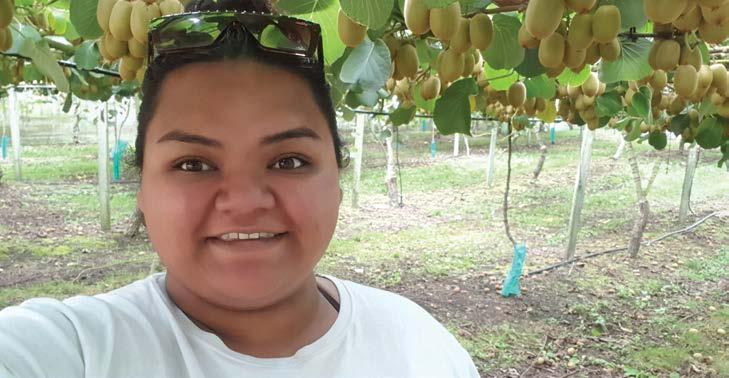
4 minute read
Study opportunity turns life around for young whānau
Samantha Dhand
Samantha Dhand never thought she could be successful at anything until she was introduced to a pathway of opportunity through studying horticulture at the Primary ITO.
Supplied by Primary ITO
Growing up has been something of a struggle for Samantha, who left school at 14 to work fruit picking in orchards in the Coromandel and Bay of Plenty.
Now 23, she’s on the path to achieve her goals to work in human resources and administration in the horticulture industry. By the age of 21 Samantha, of Ngāti Porou, had seven years’ experience in the industry working in orchards, vineyards and packhouses, but she didn’t know there was opportunity for her to succeed further in the industry. “I always thought I would be stuck in an orchard for the rest of my life day-to-day. So many people I have worked with have been doing the same job for over 30 years. I didn’t want to be that person.” Samantha is ever thankful for the day in 2019 when a Primary ITO trainer came to the orchard where she was working and suggested that she could study for a qualification in the industry.
Opportunity turns life around
It’s an opportunity that she says has turned her life around, given her hope and a positive pathway for her five-year-old tamāhine (daughter) and the 14-yearold tungāne (cousin) that she raises. “I didn’t really know that a piece of paper could get you that far. I didn’t know the Primary ITO existed and I didn’t see myself studying. “When you come from a family that is not that close and there are a lot of issues, you don’t know of the opportunities that are there.
“I never knew I would get some sort of opportunity to be able to enhance my experience and learn a lot more than I ever knew. This will be such a great opportunity for my babies.”
Samantha was raised by her grandparents, both Ngāti Porou, spending much of her early life on Pouakani Marae in Mangakino on the banks of the Waikato River. “I was brought up around my Māoritanga and I did kapahaka through my childhood.” The whānau is originally from Ruatoria, with her grandfather being from Hicks Bay. “They came from a very strong group there. Even though they moved away from the homeland they still had their connection to their whenua – we knew our connection.”
Over the years Samantha’s seen a range of work cultures in orchards, including workers lacking motivation because they don’t feel valued.
Whānaungatanga inspires the mahi
Samantha says she is overjoyed at the connection she feels working for Tauranga based kiwifruit grower Ngai Tukairangi Trust Orchards, which has shown her a different side of the industry. “To actually experience a place where Māoritanga means so much it is a different kind of feeling. It makes me feel more at home.”
“It’s the whānaungatanga, aroha, tautoko and mana within the company. The feeling of our tipuna beside us helping us achieve those individual tasks and goals but also bringing us together as a whānau.” A highlight for her was meeting the chairman in Matapihi. “He is Ngāti Porou like me and we worked out during our kōrero he had been brought up across the Makatoite river from my grandmother. That was so awesome to find that connection.”
Samantha’s experience has inspired her to work in human resources where she can bring whānaungatanga into the workplace for both staff and management in horticulture. “You don’t see many Māori in the management side and when you do you see a huge difference. That is what I want to do.”
“It’s about making it a better experience for staff so that they enjoy their mahi and feel valued. If you bring the cultural aspect in they feel the mana and āwhina at home and at work.”
Māori often get caught in a situation where they feel they have to follow in others’ footsteps or take advice which can hold them back from achievement, she says. “I didn’t realise that it is not really your family who need to believe in you, it is you that needs to believe in yourself to get there.” “People will row with you but who will continue to row that waka when you no longer have the mana too? I’ve learnt we have to help ourselves and not rely on everyone around us, because not everyone is there to help keep your waka afloat.”
Helping others to achieve
Samantha says she’s motivated to help others achieve in the industry and is thankful to her tutor Sharon Fowler who hasn’t given up on her even when she struggled. A further boost was attending the 2020 Ahuwhenua Trophy Excellence in Māori Farming Awards, the first time the event centred on horticulture.
“I couldn’t believe there were so many people coming to celebrate Māori. To see the encouragement that we have in the community makes such a big difference. “For people to acknowledge our tipuna and our whenua and bring that different perspective. They make us want to teach others where we come from.”
Two years after being introduced to an opportunity, Samantha is on a path to achieve her level three qualification in Fruit Production and having a bright future in horticulture for herself and her whānau.










